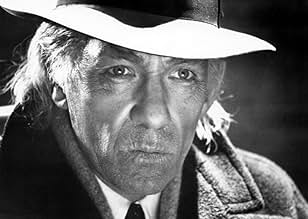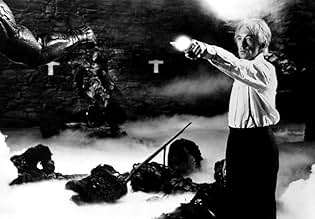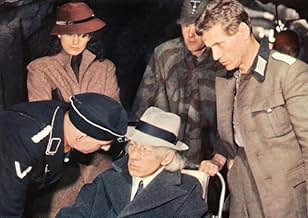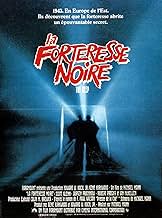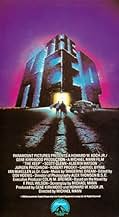Los nazis se ven obligados a acudir a un historiador judío en busca de ayuda para luchar contra el antiguo demonio que sin darse cuenta han liberado de su prisión.Los nazis se ven obligados a acudir a un historiador judío en busca de ayuda para luchar contra el antiguo demonio que sin darse cuenta han liberado de su prisión.Los nazis se ven obligados a acudir a un historiador judío en busca de ayuda para luchar contra el antiguo demonio que sin darse cuenta han liberado de su prisión.
- Premios
- 1 nominación en total
- Alexandru
- (as Morgan Sheppard)
Argumento
¿Sabías que...?
- CuriosidadesThe main set of the film was built in a disused abandoned former slate quarry at Glyn Rhonwy near Llanberis in North Wales. Some interiors of "The Keep" were filmed inside the natural stonework of the Llechwedd Slate Caverns near the historic mining town of Blaenau Ffestiniog in Gwynedd, Wales. Michael Mann once described the set by saying: "It's a black monumental structure that might have been built by a medieval Albert Speer."
- PifiasWhen Dr Cuza is translating the writing on the wall, he says "The form is the imperative" i.e. that it's a command. That's taken from the source novel, where the writing is translated as "Strangers, leave my home!" But in the film the translation is "I will be free", which is not an imperative statement.
- Citas
[Molasar appears and talks to the frightened Dr. Cuza]
Molasar: You have... death around you.
Dr. Cuza: Your hands?
[points at Molasar's powerful hands that touched him last time and healed him]
Molasar: No.
Dr. Cuza: Then, what you sense is my fate in a death camp?
Molasar: A place where people gather to die?
Dr. Cuza: A place where people are murdered!
Molasar: [loud] My people are murdered?
Dr. Cuza: Yes! And others, from all over Europe!
Molasar: [angry] Who does this?
Dr. Cuza: Their leader... in Berlin. And the soldiers in black.
Molasar: [screams] I WILL DESTROY THEM! I will consume their lives...
Dr. Cuza: When could you do this?
Molasar: When I am complete. In two nights. If... I can leave this place.
Dr. Cuza: Why couldn't you?
Molasar: Because an object of mine, the origin of my power, must be removed from the Keep and hidden in these mountains and kept save from people here... and from anyone who may come here. It must be done by someone I can trust... like you. Only then can I leave the Keep and destroy the soldiers in black and their leaders. Will you carry this object... out of here... for me?
[Molasar touches Dr. Cuza on the shoulder like a friend]
Dr. Cuza: Yes.
- Créditos adicionalesThe Keep Production Pays Tribute To Wally Veevers
- Versiones alternativasSome television versions include additional footage after the original downbeat ending, showing Eva Cuza (Alberta Watson) turn around, entering the Keep and finding the body of Glaecen (Scott Glenn), dead after the final battle with Molasar. Eva hugs Glaeken, who is revived by the power of her love.
And thus the stage is set for WW2 and man's various grievances and foibles to be played out in mythic miniature. The Keep was Michael Mann's second theatrical feature after Thief, his third if you count (the terrific) Jericho Mile. It pretty much flopped on its original release, and interest in the film is pretty small. There's been the odd screening on TV, a small VHS release in the UK in the early 2000s (when I first saw it), a big fan website being started up, run by a Mr. Stephane Pieter, the odd rep screening, and also a comic book drawn by Matthew Smith. However, the film's hard-to-find nature and its overwhelming oddness in the Mann canon has worked against it. Paramount pictures don't seem to have a great deal of enthusiasm for their film, so it isn't out on DVD yet. Furthermore, the writer of the novel, F. Paul Wilson, has never made any attempt to hide his disgust for the film.
The films is obviously the product of a stressful production in which there were to many influences jostling for dominance. This isn't to say that it isn't eerie, frightening, compelling or thought-provoking, because it's all those things. However, it's never any of those things for long enough. It's often a bit pretentious, boring and never as blood-curdling as Wilson's original book, which was a straightforward, no-frills shocker. What's odd about Mann's film is that while it strains for a sophistication above it's generic roots, it misses out on the un-forced passages of contemplation in the book, where Wilson ruminated on his different character's inner desires. This no-nonsense approach on Wilson's part had a crucial grounding effect. Without it, the film often comes across as a curious fairy-tale (in a bad way), and at other times plain daft. It's hinted at that the soldiers might be there to harness the monster for military use (why else would they be there?), there are nods Vampire mythology (Scott Glenn's magical weapon resembles a vampire hunter's kit and the monster literally feeds on the men) and Romania's relationship with German at the time, but otherwise the film is divorced from any kid of reality or genre. This means that Mann's big idea, to explain the emotional attraction of fascism and then confront the Nazis with the ultimate embodiment of fascism, which proves too much even for them, has no gravity at all: it's just rootless drama with no consistent stylistic grounding. The film's set design and cinematography do help him somewhat, though, overshadowing all the characters like much of Nazi architecture and enforcing the idea that human and supernatural evil share a common ambition to control everything.
Ultimately, the film fails to confront the same challenge all films in the war-horror sub-genre: how can you convince the audience that the other-worldly horror is greater than the evil of man. To his credit, Mann addresses in it in an original way, and tries to say the two are differently similar: the age old evil of 'Molasar' (never named in the film, but listed in the credits and faithful to the book), designed to look like some demonic Teutonic Knight, was born of hatred and a lust for power, much like the Nazis. When Major Kaempffer is finally confronted by the monster, he asks where he's come from, vainly trying to ward him off with a cross. Molasar replies with a weary condescension: "where am I from. I am From you." This exchange, one of the film's more frightening and atmospheric moments, takes place in The Keeps main entrance, knee deep in the blasted corpses of troops Molasar has just massacred, bringing to mind charred, piled corpses of Holocaust victims.
The Keep is considerably more thoughtful and ambitious than the likes of Outpost, The Bunker and Deathwatch (films it obviously inspired), but in the end it's broken-backed film, because Mann fails to marry of the war and horror genres with the same success he had in matching crime and horror in Manhunter. At times, the film is simply too frustrating, or tedious, to be compelling. The Korean R-Point was a much more creepy war-horror movie, making the grim observation that the horror unleashed on its small island setting is cyclical, like the cycle of war, an idea Mann never touches upon.
However, The keep remains more than just an interesting 'curio' as it's often termed, thanks largely to the scale of the production and some truly draw-dropping visual effects: the Nazi troops passage through the mountain pass in the opening credits, with Tangerine Dream's distinctive score rattling in the background, is a triumph, and the troop's violation of the vast crypt, the 'camera' pulling away for an age, is magnificent. It's up to you if you want to invest the time, energy and money is discovering this little-known, little-loved but memorable film.
- RolandCPhillips
- 1 dic 2009
- Enlace permanente
Selecciones populares
Detalles
- Fecha de lanzamiento
- Países de origen
- Sitio oficial
- Idioma
- Títulos en diferentes países
- El fuerte infernal
- Localizaciones del rodaje
- Empresas productoras
- Ver más compañías en los créditos en IMDbPro
Taquilla
- Presupuesto
- 11.000.000 US$ (estimación)
- Recaudación en Estados Unidos y Canadá
- 4.218.594 US$
- Fin de semana de estreno en EE. UU. y Canadá
- 1.032.295 US$
- 18 dic 1983
- Recaudación en todo el mundo
- 4.219.430 US$
- Duración1 hora 36 minutos
- Color
- Mezcla de sonido
- Relación de aspecto
- 2.35 : 1
Contribuir a esta página



